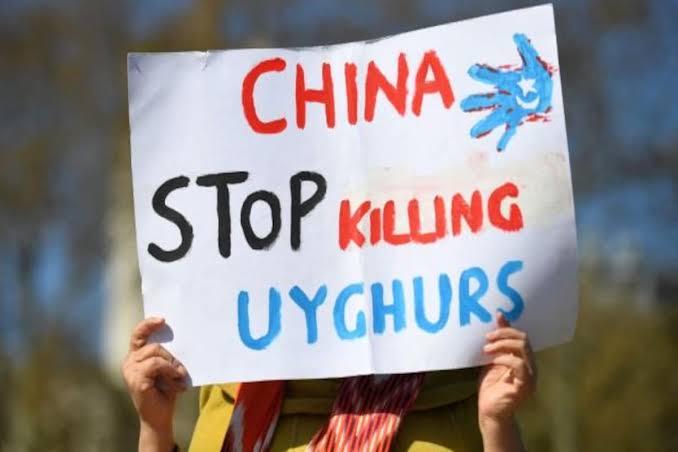No country, including Pakistan, has ever spoken against what the Chinese are doing in Xinjiang.
New Delhi: Qatar, Kuwait, Iran, Saudi Arabia, Oman, Bahrain, Afghanistan, Indonesia, United Arab Emirates, Jordan, Maldives, Iraq, Libya, Pakistan, Malaysia are among the countries whose foreign offices have officially registered their protest with the Government of India over remarks made by former BJP national spokesperson Nupur Sharma and former Delhi BJP spokesperson, Naveen Jindal, both of whom stand suspended from the party now.
Apart from these 15 countries, Islamic groupings, including the Gulf Cooperation Council (GCC) and the Organisations of Islamic Cooperation (OIC), have issued public statements on this incident. While all these countries and groupings have issued strong statements in the case of what happened in India—an incident in which an individual spoke for less than one minute on a news channel whose monthly viewership is less than 1.4 crore in a country whose population is 140 crore—these same groupings of Islamic countries and individual countries have refused to speak out against the “genocide” that the Chinese government is committing against the roughly 1.2 crore Uyghur Muslims in Xinjiang province since 2009.
Among the countries who have termed the action against these Uyghur Muslims as genocide are the United States of America, United Kingdom, Canada, Australia and Netherlands. As per reports complied by international agencies, at least 10 lakh of these Muslim ethnic group have been detained in at least 380 camps that the Chinese call “re-education” camps, similarly to Gulag camps that Russia had from 1920s to 1950s.
The Uyghurs speak a language which is similar to Turkish. They make up about half of the Xinjiang population. However, their numbers are steadily declining as state sponsored mass migration of Han Chinese (China’s ethnic majority) into Xinjiang is being carried out to dilute the Uyghur population there.
Internal reports obtained by Western agencies and media have time and again shown irrefutable evidence of the kind of treatment these Muslim population is facing in China, which includes shoot to kill anyone deemed dangerous. Well-known human rights groups, Amnesty International and Human Rights Watch, too, have published extensive reports detailing the atrocities being faced by these Muslims in the hands of the Chinese government.
A report published by Australian Strategic Policy Institute (ASPI) in 2020 had stated that thousands of mosques in Xinjiang have been damaged or destroyed in just three years. ASPI used satellite imagery and on-the-ground reporting to map destruction of these mosques. According to the study, from the original 24,000 plus mosques, less than 15,000 remained standing, and of these 15,000, at least 8,000 were damaged to some extent. The study also found that almost 50% of protected cultural sites had been damaged or destroyed, including the total destruction of Ordam mazar (shrine), an ancient site of pilgrimage dating back to the 10th century
In 2019, 37 countries, including Saudi Arabia and Pakistan, signed a letter addressed to the United Nations Human Rights Council defending Chinese President Xi Jinping’s government and dismissing reports of the atrocities that were taking place on Uyghur Muslims in Xinjiang.
In March this year, the OIC member countries, while congregating in Pakistan for the 48th Council of Foreign Ministers’ Meet, thanked Chinese Foreign Minister, Wang Yi, who was invited as a “special guest”. The member countries complimented China for the development that it was carrying out for the Muslim population in its various countries and for the investment that it was doing in these countries as a part of the Belt and Road Initiative (BRI).
No country, including Pakistan, which time and again makes efforts to establish itself as the leader of the Islamic countries, has ever spoken against what the Chinese are doing in Xinjiang. This has happened even as children as young as seven years old are being separated from their parents for months, kept in state-run orphanages without being allowed any visitors and are being “treated” for the “religious extremism” that they might have “caught” from their Uighur Muslim parents. While the children are being “treated” in orphanages, their parents and other Uighur individuals are “getting treatment” in camps that have been built to “de-radicalise” these “potential terrorists” as a part of China’s own war on terror. All these incidents were shared with The Sunday Guardian by Uighur activists, lawyers, politicians and common people who have connections in the Xinjiang region.
The official figure of those of us who have been put in these “re-education” camps, as the Chinese call them, but which are essentially jails, is 10 lakh, but locals say it is at least twice more. Even those who are not in these jails are under constant electronic surveillance, with the Chinese authorities having the power to enter their homes anytime, carry out search and frisking without giving any reason. These concentration camps have cells that are roughly 10-12 feet by 15-20 feet where 40-80 individuals are kept. Many of these individuals are mothers and fathers, and when they are taken into these camps for “treatment” by the Chinese authorities, their children are separated from them and kept in orphanages where they are ‘washed off’ Uighur nationalism.”
The Sunday Guardian reached out to the foreign ministries of each of the 15 countries and the two groupings—the GCC and the OIC—seeking their response on whether they have ever spoken out in support of the Uyghur Muslims or against the Chinese action in Xinjiang. The Sunday Guardian also sought a response on why they have chosen to keep quiet on this issue. No response was received from any of these entities till the time the story went to press.

